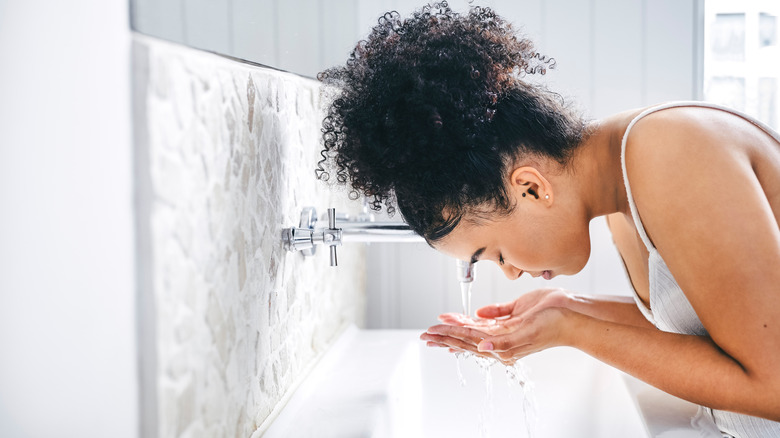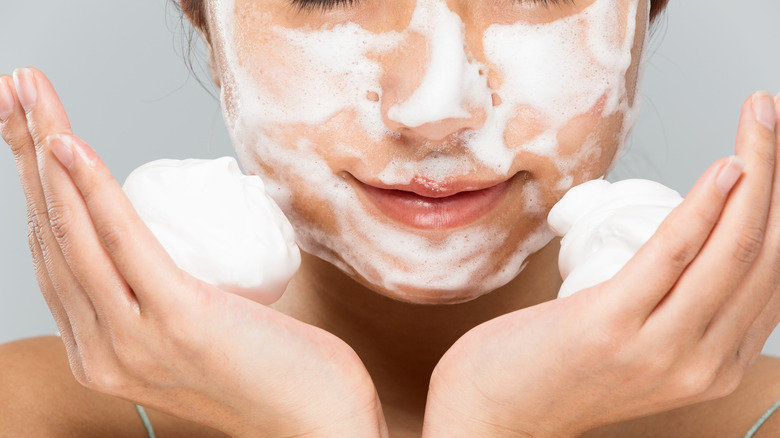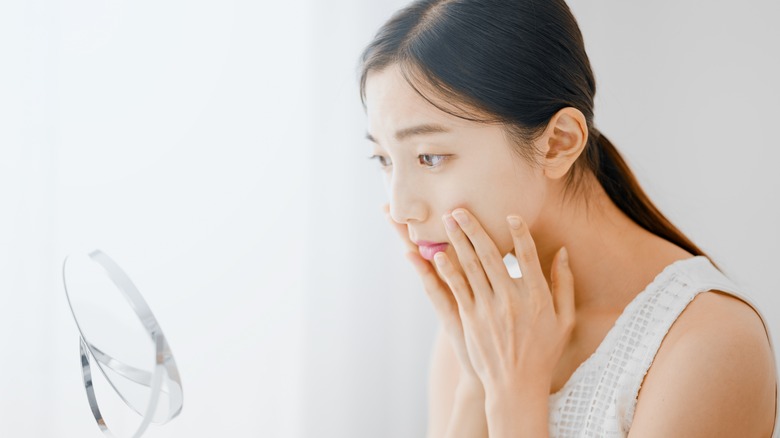Do You Really Need Different Cleansers For Day And Night? Here's The Deal
As fun as it seems to follow a complicated, multi-step skincare routine, most skin types don't need much to thrive.
Dermatologist Dr. Debra Wattenberg told Today that while there is no single routine that works for everyone, your regimen should ultimately be based on what is "geared to your skin type and skin issues." And more often than not, it doesn't require a whole medicine cabinet of serums and creams. "Most skin types can generally follow a routine of three steps in the morning and three in the evening," she added, noting that if you were only to use three products, it should include a cleanser, a serum or a cream that targets a specific skin concern, and a moisturizer. It's recommended that you apply them in this order, too.
Cleansing is the first step in any routine for a reason, and that's because this step involves removing any grime or acne-causing bacteria that lurks on the surface of your skin. Typically, people cleanse their faces in the morning and at night before they ship themselves off to dreamland, but are two different cleansers necessary? And is washing your face twice a day considered overkill?
When does it make sense to use different cleansers?
If you want to curate a pared-down skincare routine, you don't want too much variation in terms of products. But since your regimen depends on what your skin requires, you may want to use different cleansers in the morning and night time. This is especially important for people with oily and acne-prone skin.
"For oilier skin, we want more of a gel cleanser, or perhaps one with a bit of lactic acid to help break down the oil without irritating the eye skin," Danielle Gronich, a clinical esthetician, shared with The Zoe Project, noting that overly potent cleansers must also be avoided so as not to risk overdrying the skin. As it turns out, doing so will only put sebum production into overdrive. "Instead it's best to use a gentle but effective cleanser with no pore-cloggers [like coconut oil or shea butter]," she added. Additionally, regardless of your skin type, your night cleanser should ideally perform double duty. Pick one that can eliminate any traces of makeup and dirt and exfoliate the skin. Try sticking with cleansers that have salicylic acid and benzoyl peroxide in them, since these ingredients are touted for tackling blemishes.
Your face is likely still free of debris in the morning, but it may have accumulated bacteria while you tossed and turned at night, so cleansing may still be necessary. But be sure to use a cleanser that is much lighter. "Your morning cleanse should be light, hydrating, and balancing," dermatologist Dr. Anita Sturnham told Vogue. "When skin is cleansed, your day serum will penetrate deeper and work more effectively, too."
A word on over-cleansing
Two should be the ceiling number when it comes to cleansing your face. Unless you when hard at the gym during the day and need to wash off sweat and grime, cleansing more than twice in 24 hours only increases your risk of overdrying your face, which is the last thing you want to happen to your complexion.
"Washing your face more than twice a day to remove germs is not a real necessity for people, unless they are prone to skin infections," Dr. Jerome Garden, director of the Physicians Laser and Dermatology Institute in Chicago, explained to Self. "Not only does too much washing lead to dry, irritated skin, but it can actually lead to the skin paradoxically producing too much oil." Dr. Barbara Sturm, founder of the Dr. Sturm brand, told The New York Times that over-cleansing "takes the skin's lipids away and destroys skin barrier function, which in turn allows bacteria to enter and cause breakouts, redness, irritation, neurodermatitis and decreased natural resistance to UVA and UVB rays."
You'd know you'd gone overboard if your face feels "squeaky clean." If you've reached the point where your skin is taut and tight, then take that as a signal to lay off with all that cleansing.


